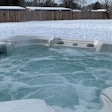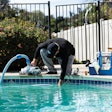The friendly rivalry between brand-loyal automobile owners goes back more than 100 years, to the days when neighbors would argue over the relative merits of the Pierce-Arrow and the Model T.
Back then the point of contention might be which one was easier to crank. Nowadays, at least in the pool and spa service community, owners are more interested in reliability, carrying capacity, access to the bed or cargo compartment, gas mileage and security, just to name a few.
But an automobile has always been more than a conveyance with a particular set of capabilities. Many people take pride in the beast that bears them through the working day and into the night. Some develop what would have to be called a relationship.
And that relationship is not always an affectionate one. There can be animosity, bordering on hatred. Sometimes it mirrors the familiar badgering bond the owner experiences at home. Other people pet the dash as they would a beloved family dog.
Regardless of the level of passion or even fondness, most people have in the back of their minds a particular make of vehicle that they trust — and they usually have a few concise reasons for it. It's the end result of years of personal experience combined with discussions and, of course, having watched thousands of TV commercials.
Probing this connection can be revealing. Earlier this year, AQUA took its annual State of the Industry survey of service people all over the country, in which it asked 27 business-related questions, including the respondents' favorite make and model of service vehicle. Three brands made up over 75 percent of the answers — Ford, GM and Toyota.
Chevy Supporters
"With the the Chevy Express 1-ton van with access package, we can haul a lot of parts in the vans plus pull our job trailers behind them. And the side access panels make getting to parts very convenient."
"Chevrolet or GMC Truck (Diesel) — enough towing power for the trailer and space for equipment in the bed if the trailer is not needed. Diesel, because it is better for the environment and my budget."
We went back and sorted through the survey, putting all the Ford people in one pile, the GM people in another pile and the Toyota people in a third, and tried to correlate the data.
The first thing we noticed is the Ford people had the most seniority in the business; 62 percent of them had more than 15 years in the business, and it's not surprising that comments about durability and reliability dominated their rationale for picking their vehicle. Again and again, toughness and longevity were cited as factors behind their loyalty, and the F-150 was repeatedly specified as an example of a truck with a never-say-die attitude.
"Over 300,000 miles and counting," one respondent said of his F-150.
What They Do
In terms of business focus, every single Chevy user was doing some kind of repair work, but the number that stood out here was the very small number of Toyota drivers doing renovation work. This is no doubt due to the fact that the Tacoma light truck dominates this group, a vehicle better suited for smaller repair and cleaning/water balance work.
In terms of business size, our Chevy owners were the largest group of sole proprietors, with 41 percent, while the Toyota owners dominated the midsize service company category (two to four year-round employees) with 50 percent, and Ford owners generally had the larger service companies, with the highest percentage coming from companies with more than five full-time year-round employees.
But that could change over time. Toyota owners were in full growth mode last year with a full third of respondents adding staff, by far the highest percentage.
One respondent credited his company's long-range strategic design as the reason for its expansion, saying, "The plan from the beginning has been to grow slow over time. Starting with a stable customer base and adding referrals has resulted in steady growth."
Ford Fans
"The Ford Ranger is our best fuel mileage vehicle for doing weekly pool maintenance. We have one 2000 Ford Ranger with over 235,000 miles on it . . . Still running strong."
"The Ford Ranger with the extended cab is the perfect vehicle for cleaning pools. It's reliable, fuel efficient and has the right height of bed."
It comes as no surprise, considering the expansive atmosphere at the Toyota shops surveyed, that these companies were also raising fees. A full 45 percent of Toyota companies raised service rates and fees last year compared to only 15 percent of Chevy owners and 29 percent of Ford owners.
And competition figures also reflected this business environment. Over 50 percent of Chevy owners, with very low rates of fee increase, reported stiffer competition from competitors in the area, as opposed to only one in three Toyota shops. Ford owners were again in the middle with 40 percent reporting an increase in competition for customers.
Despite these numbers, the Chevy owners still took in the most revenue. Over a quarter of them reported a gross take of over $400,000 as opposed to only 16 percent of Toyota owners.
Perhaps the most intriguing result from the survey involves the use of GPS systems and tracking devices. Nearly three quarters of Chevy owners used this equipment last year on their service vehicles, compared to only 54 percent for both Ford and Chevy owners.
Toyota Proponents
"I like the Toyota 4-Runner. Pretty good gas mileage, low maintenance costs and the engines run forever. Comfortable, sharp and can carry tools, chems, replacement equipment, etc., and you can still stop to eat dinner without worry of getting things stolen like you can with just a pickup."
"Toyota Tacoma, long bed, double cab. Not too high, easy to reach in, roomy, good gas mileage and very reliable."
Of course, the uses for such devices vary. Such equipment can track a vehicle for monitoring purposes but can also be used to find the most efficient route or simply figure out where the heck a truck is located.
Keep It Clean
The debate over which truck or van truly offers the service professional the best value will continue as long as there are pools to clean and pumps to replace. With each passing year, manufacturers struggle to come up with new features which might settle that debate in their favor and attract the professional buyer, whether it's better gas mileage, an easier loading model, more space or just a sleeker or more muscular look.
By the same token, there will always be those who share the conviction of one respondent who said, "It doesn't matter what kind of truck or van you have as long as you keep it clean and professional looking."
Comments or thoughts on this article? Please e-mail [email protected].












































